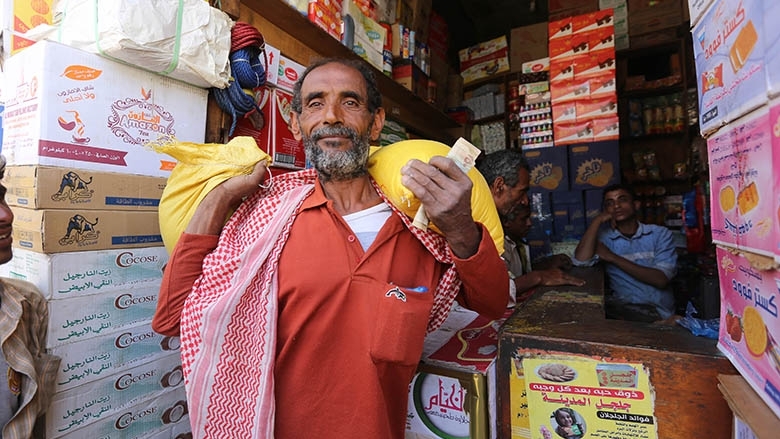Yemen’s very difficult economic challenges before the current conflict cannot be compared to the intensely critical situation the country is facing today. Yemen has become the site of the world’s worst humanitarian crisis. Food and fuel imports were severely affected and vital hydrocarbon exports fell, triggering a shortage of availability of foreign currency and causing inflation to accelerate.
The situation in Yemen is now at emergency levels, and the international community is rightly alarmed by the rapid deterioration of humanitarian conditions and concerns about disruptions in food supply. An estimated 17.8 million Yemenis, 60 percent of the population, are food insecure and require urgent humanitarian assistance. Approximately 9.4 million people are in an immediate crisis while 8.4 million more are on the brink of famine.
A new report, Securing Imports of Essential Food Commodities to Yemen examines the financial and logistical constraints the private sector is facing to importing basic food commodities, including wheat, flour and rice. The report offers solutions to help facilitate the import of food and other essential goods to ease the humanitarian conditions in Yemen.
Yemen depends almost entirely on imports to meet the local market demand for its staple food commodities. Those imports are secured almost entirely by the private sector which have shown great resilience and have been successful in sustaining the continued supply of those commodities into the country. However, despite their ability to date, these market mechanisms could fail due to rising costs and risks.
According to the report, the biggest challenge to food security in Yemen is weakened demand. Food importers, wholesalers and retailers have identified the drop in purchasing power as a key challenge to their businesses. The majority of the population have lost their sources of income, which has resulted in the near-famine conditions that are present today. The coping mechanisms of a large part of the population have changed due to the decrease in purchasing power. Today, an increased number of people resort to increased levels of borrowing for food consumption as well as reliance on income support from humanitarian aid or remittances.
Access to foreign exchange (FX) has emerged as a key constraint faced by food importers, with limited availability and rising costs being the most pressing challenges. Additionally, difficulties withdrawing and transferring bank funds have eroded trust in the banking system and contributed to the rise of money exchanges as the major provider of finance – which comes with greater costs and risks. Finally, food importers are facing logistical challenges that include the disruption of access to key ports such as Al-Hodeida, Aden, and Saleef and rising costs due to delays in obtaining clearances for incoming shipments.
The report calls for the international community to scale-up income support measures to ease the burden on the Yemeni population. This includes scaling-up existing efforts to provide income support (cash transfers) and food assistance to address the negative impact of eroding incomes. Resuming income payments to public servants, retirees and social welfare beneficiaries should also be encouraged.
Finally, the report provides recommendations on what the international community and Yemeni authorities should do to strengthen the resilience of the food import value chain against rising costs and risks:
Facilitate Access to Foreign Exchange (FX) to Secure Food Imports
- Foreign aid - one of the few remaining sources of foreign exchange inflows to Yemen - could be used to help cover foreign exchange needs of food imports.
- Donors, authorities and banks could collectively agree to use aid inflows for food imports on a priority basis, building on the wide consensus of the importance in sustaining food imports.
- Facilitating access to FX would not only address food importers’ challenges to access FX, but would also help reduce high fund transfer costs due to the risks associated with transferring money through informal channels.
Restore Trust in the Financial System
- Restoring liquidity in the financial system is an important measure to reduce transaction costs and risks for payments not only for the food value chain, but the entire economy.
- The Central Bank of Yemen should formulate a phased and time-bound action plan to restore liquidity in the financial system. The payment of accrued interest on Treasury bills held by banks could be a first step to ease liquidity pressures on the banking sector.
Facilitate Clearance for Food Import Shipments
- Establish an efficient and predictable clearance process enabling access of food supplies through all available ports.
- The recommended interventions are also expected to improve recovery efforts and the effectiveness and delivery of humanitarian, reconstruction, and recovery activities.
